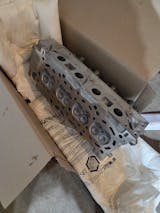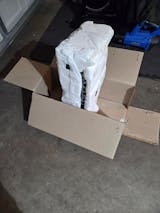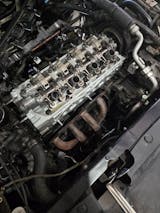Have you been experiencing engine troubles lately? Perhaps you've noticed a rough idle, decreased fuel efficiency, or even strange vibrations when you're behind the wheel. These could be signs of a deeper issue lurking under the hood, such as a cylinder head misfire.
Cylinder Misfire Symptoms can manifest in various ways, often catching drivers off guard with their subtlety. However, understanding these symptoms can help you address the issue promptly, ensuring your vehicle stays in top condition. Let’s take a look at what can cause this issue.
Can Cylinder Misfiring Occur in Vehicles, and How Common is It?
Experiencing a cylinder misfire is a common issue that many drivers encounter with their vehicles. When a cylinder misfires, it means that the fuel-air mixture in one of the engine's cylinders is not igniting properly. The symptoms of this include a rough idle, reduced fuel efficiency, power loss, and unusual engine sounds. Commonly known as cylinder misfire symptoms or engine misfire symptoms, these signs can vary in severity depending on the extent of the misfire. Drivers may notice a jerking sensation or hesitation when accelerating, as well as a rough or uneven idle. The engine can make popping or sputtering sounds. While a misfiring cylinder is a relatively common issue, it is not safe to ignore. Continuing to drive with a misfire can lead to further damage to the engine and other components, as well as increased emissions and decreased fuel efficiency. It is crucial to address the problem promptly so that costly and extensive repairs can be avoided in the future.
What Does a Cylinder Misfire Feel Like?
Experiencing a cylinder misfire can be disconcerting, as it often manifests in subtle but noticeable ways. When a cylinder misfires, the engine's performance may feel compromised, leading to a range of symptoms that can affect your driving experience. The sensation of roughness or instability during idle is one of the most common symptoms of an engine misfire. You may notice your vehicle shaking or vibrating more than usual, indicating a lack of smooth operation.
Additionally, when you accelerate, you might feel hesitation or jerkiness, as if the engine is struggling to deliver power consistently. These misfiring cylinder symptoms can make driving feel less comfortable and may even impact your vehicle's ability to accelerate smoothly. Overall, a cylinder misfire can create a sense of unease and uncertainty while driving, prompting you to address the issue promptly. As for the misfiring cylinder cost, it can vary depending on the cause and severity of the problem, ranging from minor repairs like replacing spark plugs or ignition coils to more extensive fixes such as repairing damaged engine components.
Causes of Cylinder Misfires
There are several potential causes of a cylinder misfire, ranging from minor issues to more serious mechanical problems. Some of the most common culprits include:
Faulty Spark Plugs: The ignition of the fuel-air mixture within the cylinders relies on the functionality of spark plugs. Should a spark plug become worn or damaged, it might fail to generate the robust spark necessary for igniting the mixture, thus resulting in a misfire.
Malfunctioning Ignition Coil: For the fuel-air mixture to ignite at the spark plugs, a high voltage is necessary to generate at the ignition coil. If there's a fault in the ignition coil, it can lead to the generation of a weak or irregular spark, which in turn can trigger cylinder misfires.
Clogged Fuel Injectors: When fuel injectors supply fuel to the combustion chamber, it combines with air and is ignited by the spark plug. However, if a fuel injector becomes obstructed or contaminated, it can hinder the delivery of the correct fuel quantity, potentially leading to a misfire.
Vacuum Leaks: Cylinder misfires may occur from a disruption in the air-fuel mixture brought on by a vacuum leak in the intake manifold or vacuum hoses. Typical origins of vacuum leaks encompass cracked hoses, gaskets, or seals.
Compression Issues: A malfunctioning engine can also cause cylinder misfires if it suffers from compression issues, for example, worn piston rings or leaky valves. If the combustion chamber cannot maintain the proper pressure, it may result in incomplete combustion and misfires.
Is Driving With a Misfiring Cylinder Safe or Not?
Driving with a misfiring cylinder is unsafe. Neglecting the signs of a misfire can result in additional harm to your vehicle's engine and other parts, along with heightened emissions and reduced fuel efficiency.
If you suspect that your vehicle has a misfiring cylinder, it's important to address the issue as soon as possible to prevent more extensive and costly repairs down the road. Experiencing engine misfire symptoms, such as rough idle, decreased fuel efficiency, or unusual vibrations while driving, can be indicative of a misfiring cylinder. When a cylinder misfires, the fuel-air mixture in one of the engine's cylinders fails to ignite properly, leading to various issues.
Common cylinder misfire symptoms include a jerking sensation or hesitation when accelerating, rough or uneven idle, and even strange engine noises like popping or sputtering sounds.
Neglecting the symptoms of a misfiring cylinder can escalate into larger issues and potentially expensive repairs. Hence, it's vital to tackle the problem promptly to avert further harm to the vehicle. Operating a vehicle with a misfiring cylinder is unsafe, as it can cause diminished engine performance, heightened emissions, and potential harm to other parts of the vehicle.
Additionally, continuing to drive with a misfire can lead to more severe issues and higher repair costs in the long run. Hence, if you encounter any symptoms of a cylinder misfire, it's imperative to promptly seek diagnosis and repair from a certified mechanic.
How Much Does It Cost To Fix A Cylinder Misfire?
The cost of repairing a cylinder misfire can fluctuate based on the underlying cause or the severity of the damage incurred. In general, addressing minor issues such as spark plug replacement or ignition coil replacement can cost anywhere from $100 to $300. However, the repair costs can escalate significantly if the misfire is due to more serious issues, such as compression problems or fuel system issues. A reliable mechanic can offer an accurate diagnosis and provide an estimate for repairs. If you want to know about the cost of cylinder head replacement, Click here
Can you tell me how much I should expect to spend if I need to replace my vehicle's cylinder heads?
Replacing cylinder heads can be a significant investment, with costs ranging from $500 to $2000 or more per cylinder head. However, the exact cost will depend on various factors, including your vehicle's make and model, the damage's extent, and whether you opt for new or refurbished cylinder heads. It's crucial to seek advice from a trustworthy mechanic or a specialist in cylinder heads to ascertain the most suitable course of action tailored to your individual circumstances.
The Cylinder Head Experts
When it comes to cylinder head issues, you need a team of experts you can trust to provide reliable solutions and unparalleled service. That's where Allied Motor Parts comes in. With our extensive experience and expertise in the realm of cylinder heads, we're here to help you figure out the complexities of engine misfires and unlock the secrets to optimal performance.
If you're experiencing cylinder misfire symptoms or need assistance with cylinder head replacement or repair, don't hesitate to reach out to our knowledgeable team. Our extensive selection of cylinder heads and associated components is designed to cater to your individual requirements and financial constraints. Trust Allied Motor Parts to provide robust solutions and unparalleled support for all your cylinder head needs.
Have more questions related to “Cylinder Head”? For any inquiries or clarifications, feel free to reach out to our dedicated support team at sales@alliedmotorparts.com or by calling 866-766-9955. The Allied Motor Parts Expert Support Team is readily available to assist you with any questions or concerns you may have. Additionally, explore our blog section to delve deeper into cylinder heads and find answers to all your queries.








